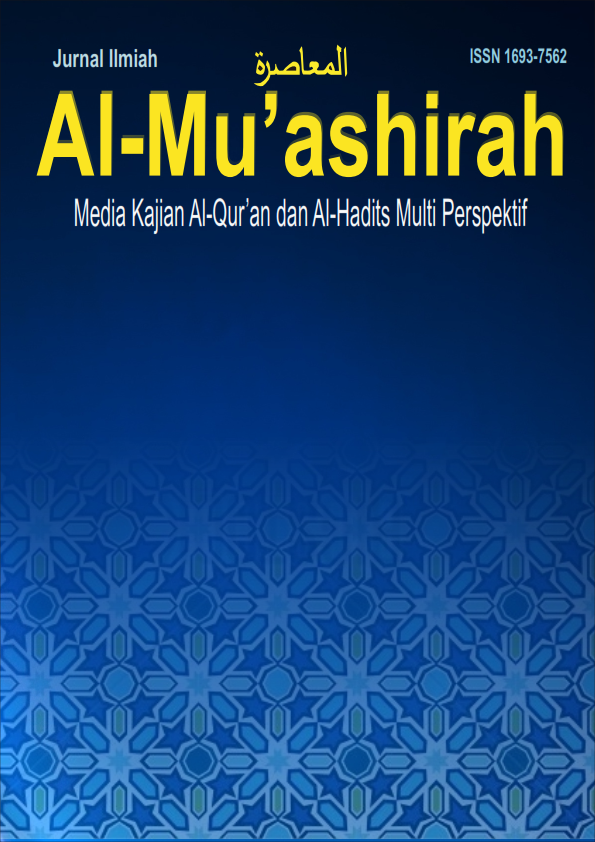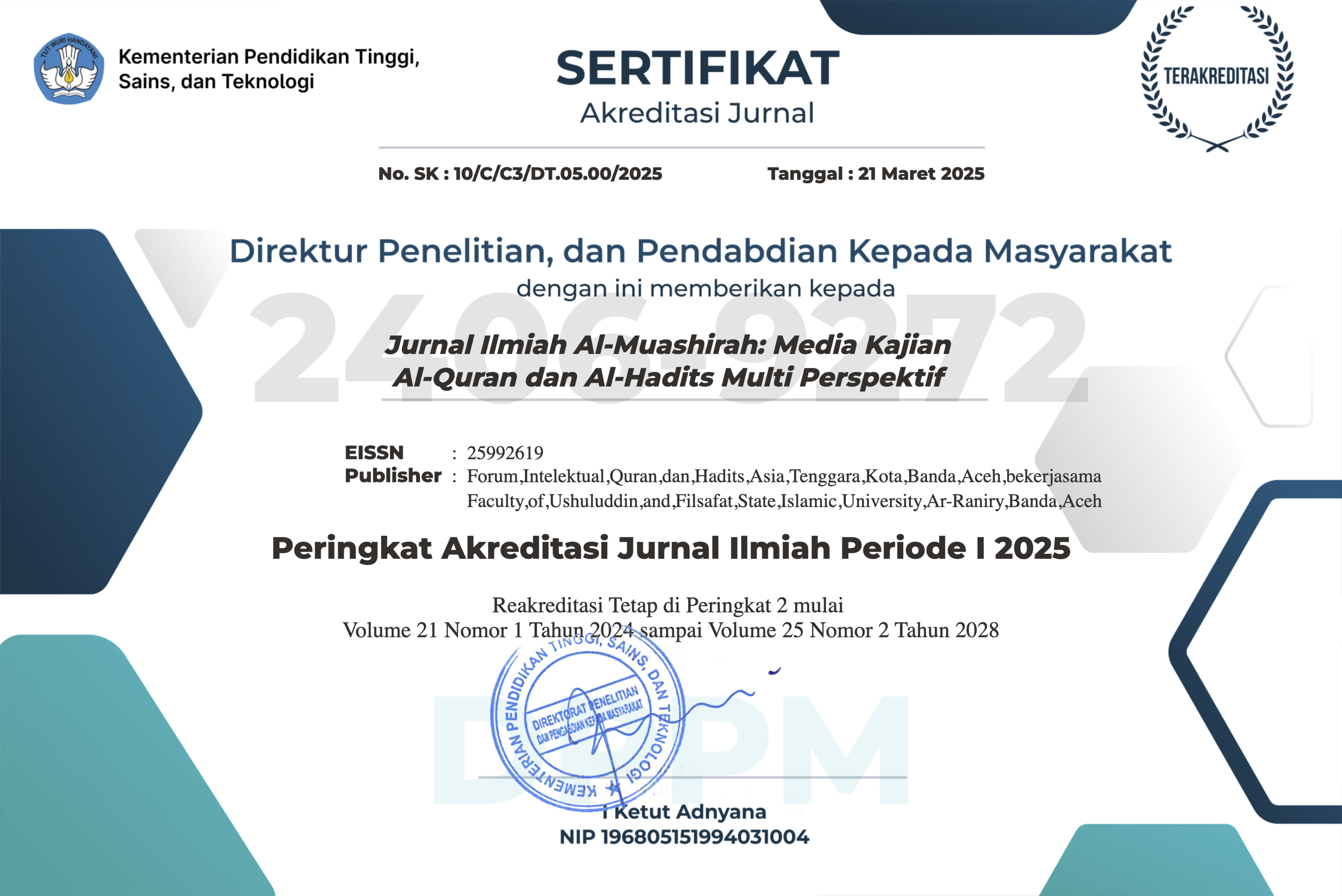Reframing Nusyuz in Islamic Family Law: A Maqasid-Based Reading of Ibn Asyur on Quran 4:34 and 4:128
DOI:
https://doi.org/10.22373/jim.v22i2.30527Keywords:
nusyuz, Ibn Asyur, maqasid al shariah, Quranic exegesis, Islamic family law, mediationAbstract
This article examines the Quranic concept of nusyuz through Ibn Asyur’s al Tahrir wa al Tanwir and develops a maqasid oriented account for addressing marital conflict in contemporary Muslim families. The study adopts a qualitative library based method that closely reads Q 4.34 and Q 4.128 and triangulates classical fiqh writings thematic exegesis and recent scholarship on family law. The analysis shows that nusyuz is a relational breach that may be committed by either spouse and that Ibn Asyur proposes a gradual and ethically constrained sequence that begins with counsel then proceeds to separation of beds and only allows corrective action that must remain symbolic and non violent while prioritizing mediation whenever harm is likely. Reading the two verses together yields a symmetrical framework that protects dignity prevents harm and restores rights by aligning procedural steps with the objectives of justice compassion and public welfare. The article concludes that this maqasid based synthesis offers a text faithful and context sensitive basis for counseling adjudication and policy in Islamic family law and it recommends empirical evaluation in courts counseling services and community mediation to assess feasibility safeguards and effectiveness.
Downloads
References
Alya Azaly dan Muhammad Faisal Hamdani, Konsep Nusyuz Suami Menurut Pandangan Faqihuddin Abdul Kodir Tafsir Qs. An Nisa Ayat 34 dan 128, Jurnal Ilmiah Ahwal Syakhshiyyah (JAS), Volume 7 Nomor 1 Tahun 2025
Al-Qardhawi, Yusuf. Fatwa-Fatwa Kontemporer. Jakarta: Gema Insani, 2007.
Amelia, Fitroh Aida, Nahdliatul Akmalia, and Widodo Hami. “Analisis Nusyūz Istri Terhadap Suami (Studi Kasus Pasangan Suami-Istri Di RT. 14 Winong Kajen).” Posita: Jurnal Hukum Keluarga Islam 2, no. 1 (June 2024): 1–11. https://doi.org/10.52029/pjhki.v2i1.155.
Arni, Jani. “Tafsir al-Tahrir wa al Tanwir Karya Muhammad Al-Thahrir ibn Asyur.” Jurnal Ushuluddin 17, no. 1 (2011). http://dx.doi.org/10.24014/jush.v17i1.684.
’Asyūr, Muhammad al-Tāhir ibn. Al-Tahrīr Wa al-Tanwīr. Vol. 23. Tunis: Dar Tunisiyah, 2008.
———. Maqāṣid Al-Sharī’ah al-Islāmiyah. Beirut: Dar al-Kitab al-Lubnani, 2011.
Al-Nawawi, Yahya ibn Sharaf, al-Majmu' Sharh al-Muhadhdhab, Beirut: Dar al-Ma'arif, 1997, Jilid 16
Al-Kasani, Abu Bakr Muhammad ibn Abi Sahl, Badai' al-Sana'i', Jilid 2.
Al-Mardawi, Muhammad ibn Ahmad, al-Insaf, Beirut: Dar al-Maktabah al-Ilmiyah, 2000, Jilid 5.
Al-Ṭabarī, Abū Jaʿfar Muḥammad ibn Jarīr Jāmiʿ al-Bayān ʿan Taʾwīl āy al-Qurʾān (Tafsir al-Ṭabarī), Vol. 8.
Al-Qurṭubī, Abū ʿAbd Allāh Muḥammad ibn Aḥmad ibn Abī Bakr al-Anṣārī, Al-Jāmiʿ li Aḥkām al-Qurʾān, Vol. 6.
Al-Rāzī, Fakhr al-Dīn, Mafātīḥ al-Ghayb (Tafsir al-Kabīr), Vol. 8.
Hamdi, Muh. Rizal. “Konsepsi Nusyūz Dan Siqaq Dalam Hukum Perkawinan Islam.” JURNAL DARUSSALAM: Pemikiran Hukum Tata Negara Dan Perbandingan Mazhab 1, no. 2 (December 2021): 123–32. https://doi.org/10.59259/jd.v1i2.12.
Hasan, M. Ali. Masail Fiqhiyah: Kajian Hukum Islam Kontempore. Jakarta: Raja Grafindo Persada, 2011.
Ibn Qudamah, Abdullah ibn Ahmad, al-Mughni, Beirut: Dar al-Haya, 1997, Jilid 7.
Ibn Katsīr, Abū al-Fidāʾ Ismāʿīl ibn ʿUmar, Tafsīr al-Qurʾān al-ʿAẓīm, Vol. 3.
Kementerian Agama. Al-Qur’an Dan Terjemahannya. Jakarta: Badan Litbang dan Diklat Kementerian Agama RI, 2019.
Lajnah Pentashihan Mushaf al-Qur’an. Tafsir Al-Qur’an Tematik. Jakarta: Kamil Pustaka, 2014.
Manzur, Ibnu. Lisān Al-’Arab. Vol. 5. Beirut: Dar al-Kutub al-’Ilmiyyah, 2009. https://shamela.ws/book/1687/2639.
Mauluddin, Moh. “Ayat-Ayat Jihad Perspektif Tafsir Maqasidiy Ibnu Asyur.” Al Furqan: Jurnal Ilmu Al Quran Dan Tafsir 6, no. 1 (June 2023): 1–19. https://doi.org/10.58518/alfurqon.v6i1.1734.
Muawaffaq, M, and Kholid Irfani. “Maqashid Syariah dalam Perspektif Ibnu Asyur.” Attujjar: Jurnal Ekonomi Syariah 6, no. 1 (2021).
Nikmah, Lutfiyatun. “Penafsiran Ṭāhir Ibn ‘Āsyūr Terhadap Ayat-ayat tentang Demokrasi: Kajian atas Tafsir al-Taḥrīr wa al-Tanwīr.” Journal of Islamic Studies and Humanities 2, no. 1 (June 2017): 79–103. https://doi.org/10.21580/jish.21.2517.
Salam, Nor. “Konsep Nusyūz Dalam Perspektif Al-Qur’an (Sebuah Kajian Tafsir Maudhu’i).” De Jure: Jurnal Hukum Dan Syar’iah 7, no. 1 (June 2015): 47–56. https://doi.org/10.18860/j-fsh.v7i1.3511.
Sidik, Azis Abdul, and Ihsan Imaduddin. “Analisis Penafsiran Tokoh Feminis Terhadap Ayat-Ayat Nusyūz Dalam Al-Qur’an.” Jurnal Iman Dan Spiritualitas 3, no. 1 (February 2023): 11–18. https://doi.org/10.15575/jis.v3i1.23771.
Yudha, T Dahlan Purna. “Sanksi Pelaku Nusyūz (Studi Pandangan Mazhab Syafi’i & Amina Wadud).” Jurisprudensi: Jurnal Ilmu Syariah, Perundang-Undangan dan Ekonomi Islam 9, no. 2 (2017).
Zayd, Wasfi ‘Asyur Abu. Nahwa Al-Tafsir al-Maqashidi Li al-Qur’an al-Karim Ru’yah Ta’sisiyah Li Manhaj al-Jadidfi Tafsir al-Qur’an. Jakarta Selatan: PT. Qaf Media Kreativa, 2019.
Zuhaili, Wahbah al-. Al-Tafsir al-Munir Fī al-Akidah Wa al-Syari’ah Wa al-Manhaj. Vol. 3. Damascus: Dar Al-Fikr, 2003.
Downloads
Published
Issue
Section
License
Copyright (c) 2025 Jani Arni, Syamruddin Nasution, Dasman Yahya Ma’ali, Jamaluddin, Agus Firdaus Chandra

This work is licensed under a Creative Commons Attribution-ShareAlike 4.0 International License.
Authors who publish in Jurnal Ilmiah Al-Mu'ashirah agree to the following terms:
- Authors retain copyright and grant the journal right of first publication with the work simultaneously licensed under a Attribution-ShareAlike 4.0 International (CC BY-SA 4.0) License that allows others to share the work with an acknowledgment of the work's authorship and initial publication in this journal.
- Authors are able to enter into separate, additional contractual arrangements for the non-exclusive distribution of the journal's published version of the work (e.g., post it to an institutional repository or publish it in a book), with an acknowledgment of its initial publication in this journal.
- Authors are permitted and encouraged to post their work online (e.g., in institutional repositories or on their website) prior to and during the submission process, as it can lead to productive exchanges, as well as earlier and greater citation of published work (See The Effect of Open Access).














